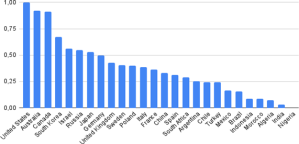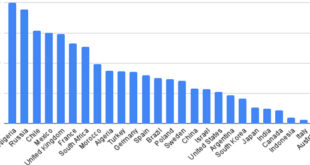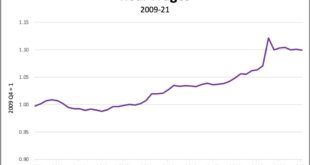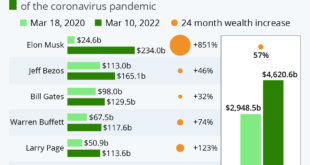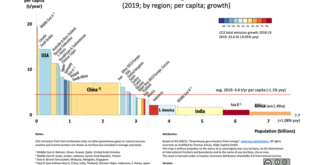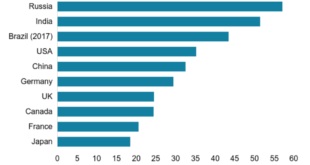from Jorge Buzaglo and Leo Buzaglo Olofsgård and current RWER issue Ecological Damage Index The ecological dimension of the extended failure index includes only one indicator. There are of course many other sources of ecological damage, but climate warming is by far the most dangerous and urgent. GHG per capita emissions: That is, the annual greenhouse gas emissions of the average individual in the country. The personal GHG footprint reflects the country’s...
Read More »Socio-Economic Dysfunction index – a failure index
from Jorge Buzaglo and Leo Buzaglo Olofsgård and current RWER issue The extensive failure index defines six dimensions of economic and social malaise: socio-economic dysfunction, ecological damage, exclusion, distress, militarism, and alienation. Each of these dimensions is composed of a number of indicators of particular flaws. The (re-indexed) average of the indicators makes the index of the dimension. The (re-indexed) average of the indices for the six dimensions mentioned makes the...
Read More »Paul Krugman, China, mRNA vaccines, and right-wing populism
from Dean Baker It is our policy on technology that drives inequality, it is not the technology. I rarely disagree with Paul Krugman’s columns, but every now and then he does say something that I have to issue with. In a column last month, Krugman complained about the enormous costs associated with China’s zero COVID-19 policy. He tied it to its reliance on old-fashioned Chinese vaccines that used dead virus material, instead of using the mRNA vaccines developed by researchers in the...
Read More »Rebrand this!
from David Ruccio It’s not price gouging, corporations tell us—it’s inflation. You know, supply and demand. Not enough supply, because of forces beyond their control, and too much demand, but they’re doing the best they can to meet it. Not a word about profits, though. Not from the corporations. And not from mainstream economists and pundits (or, for that matter, from the Biden administration, which prefers to point the finger at Putin). When they do go beyond supply and demand, they...
Read More »The U.S. billionaires profiting the most from the pandemic
While Russian billionaires have been the focus of attention due to the ongoing fighting in Ukraine and the ensuing sanctions against Russian individuals and entities, their counterparts in the United States have accumulated an additional $1.7 trillion of net worth since the start of the pandemic two years ago. This marks an increase of 57 percent compared to March 2020 data from Forbes aggregated by U.S.-based organization Americans For Tax Fairness (ATF). As our chart shows, four of the...
Read More »Weekend read – Expected utility theory — a severe case of transmogrifying truth
from Lars Syll Although the expected utility theory is obviously both theoretically and descriptively inadequate, colleagues and microeconomics textbook writers all over the world gladly continue to use it, as though its deficiencies were unknown or unheard of. Daniel Kahneman writes — in Thinking, Fast and Slow — that expected utility theory is seriously flawed since it doesn’t take into consideration the basic fact that people’s choices are influenced by changes in their wealth. Where...
Read More »Per capita CO2 emissions by country
Ethical criteria which hold the sustainability of life at their core
from Fernando García-Quero and Fernando López Castellano and RWER current issue Overconfidence in the magical thinking of technification, economic growth, the free market, and neoliberal globalization has led many to forget that the state is the main policy architect and actor when facing a crisis. Successful responses to Covid-19 have shown, once again, the central role of states in organizing political measures that foster and maintain the welfare of their populations, through actions...
Read More »Countries where the 1% have the largest share of wealth
Consumer energy prices: stylized post 1960 facts
At this moment, retail energy prices (prices paid by consumers and companies for final use of energy) are, compared with other consumer prices, rising fast. Has this happened before? Yesterdays post shows that in the EU and since 2006 the rise is exceptional. But what shows when we look further back in time? For reasons of convenience and because the USA data stretch back to 1960 while the EU data only stretch back to 1997 I’ve tinkered a little with USA consumer price data. The answer...
Read More » Real-World Economics Review
Real-World Economics Review

